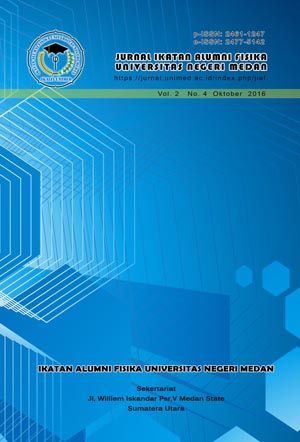PENGARUH MODEL PEMBELAJARAN BERBASIS MASALAH DENGAN BANTUAN ANIMASI TERHADAP HASIL BELAJAR SISWA
DOI:
https://doi.org/10.24114/jiaf.v2i4.7826Keywords:
model pembelajaran berbasis masalahAbstract
Penelitian ini bertujuan untuk mengetahui pengaruh model pembelajaran berbasis masalah dengan bantuan animasi macromedia flash terhadap hasil belajar dan aktivitas siswa pada materi pokok suhu dan kalor di selas X semester II SMA Katolik Trisakti Medan T.P. 2015/2016. Jenis penelitian ini adalah quasi eksperiment menggunakan desain penelitian control group pretest-posttest. Pengambilan sampel dilakukan dengan cluster random sampling, yaitu kelas X-1 sebagai kelas eksperimen dan kelas X-5 sebagai kelas kontrol dengan masing-masing siswa berjumlah 35 orang. Hasil uji hipotesis menggunakan uji beda (uji t) diperoleh ada pengaruh yang akibat penerapan model pembelajaran berbasis masalah dengan bantuan animasi macromedia flash terhadap hasil belajar pada materi pokok suhu dan kalor di selas X semester II SMA Katolik Trisakti Medan T.P. 2015/2016.References
Arikunto, S., ( 2009), Manajemen Penelitian, Jakarta: Rineka Cipta
Arends, R. I., (2012), Learning to Teach Ninth Edition, New York, McGraw Hill, terjemahan Frida, Y. M., (2013), Belajar untuk Mengajar Edisi 9 Buku 1, Jakarta: Salemba Humanika
Manurung, S.R., 2015, Pengaruh Model Pembelajaran Berdasarkan Masalah Berbantu Multi Media Interaktif Terhadap Hasil Belajar Siswa Pada Materi Fluida Dinamis di Kelas XI Semester II SMA N. 4 Medan T.P 2014/2015, Prosiding Seminar Bersama, ISSN:978-983-44636-9-4, Institut Pendidikan Guru Kampus: 529-541
Sanjaya, W., (2011), Strategi Pembelajaran Berorientasi Standar Proses Pendidikan, Jakarta: Prenada Media Grup
Slameto, (2003), Belajar dan Faktor-faktor yang Mempengaruhinya, Jakarta: Rineka Cipta
Sudjana, (2005), Metode Statistika, Bandung: Tarsito
Downloads
Published
Issue
Section
License
Copyright (c) 2017 JURNAL IKATAN ALUMNI FISIKA

This work is licensed under a Creative Commons Attribution 4.0 International License.
Authors who publish with this journal agree to the following terms:- Authors retain copyright and grant the journal right of first publication with the work simultaneously licensed under a Creative Commons Attribution License that allows others to share the work with an acknowledgement of the work's authorship and initial publication in this journal.
- Authors are able to enter into separate, additional contractual arrangements for the non-exclusive distribution of the journal's published version of the work (e.g., post it to an institutional repository or publish it in a book), with an acknowledgement of its initial publication in this journal.
- Authors are permitted and encouraged to post their work online (e.g., in institutional repositories or on their website) prior to and during the submission process, as it can lead to productive exchanges, as well as earlier and greater citation of published work (See The Effect of Open Access).

